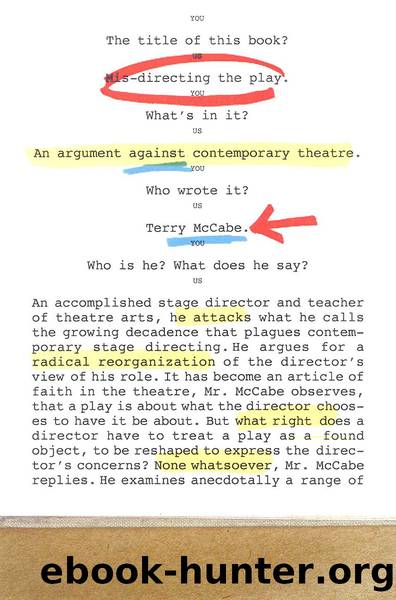Mis-Directing the Play: An Argument Against Contemporary Theatre by Terry McCabe

Author:Terry McCabe [McCabe, Terry]
Language: eng
Format: epub
Tags: Performing Arts, theater, Direction & Production, Drama, General
ISBN: 9781461699415
Google: fQh1AQAAQBAJ
Publisher: Ivan R. Dee
Published: 2008-12-16T23:55:13.584262+00:00
If you aspire to do the work that the directorâs art requires, the presence of a production dramaturg, though intended to aid you, damages your ability to do your job well. Your natural authority in design conferences and the rehearsal roomâif it is to exist at allâderives from your mastery of the play at hand. To be sure, your technical expertise as a stager of action also plays a part, but even it will not confer authority on you unless it is clearly in the service of a broad and deep understanding of the play. This authority is inevitably weakened if someone else is seen as the master of the play.
If the involvement of another is considered necessary to keep the production true to the play, the director has become the person against whom the play must be protected.
If the director needs an intermediary to a playwright who is right there in the rehearsal room, the director is clearly not the person the playwright trusts most with the play.
Worst of all, if the cast looks elsewhere for help in understanding the text, the director has become distanced from the very task of directing.
The situation is not one of usurpation, it is one of abdication. Frequently the play should be protected from some god-awful directorial concept, and the playwright does need an intermediary, and the actors canât rely on the director to make the play clear. The dramaturg cannot be blamed for these crises, and my argument is not really an attack on dramaturgs. There are many excellent dramaturgs, just as there are many excellent designated hitters in the American League. But the designated hitter rule, because it creates an unnecessary team member, is a disservice to baseball, and the emergence of the dramaturg as a distinct position is likewise a disservice to the theatre. Independent of the performance of individual dramaturgs, it has this harmful effect: it puts distance between the director and the play.
The person to be blamed is, of course, the director. If by dramaturgy we mean a coherent approach to understanding all the various worlds of the play, certainly it is work that must be done. As the contemporary director has concentrated on the physical elements of production, concern with these elements has come closer and closer to defining for many people what directing is. But this definition ignores many necessary directorial functions. And so into the void have come talented dramaturgs to do what must be done.
This development, if unarrested, will leave the director a craftsman and not an artist. The directorâs job is to understand the play and to communicate it to others. If that job is handed over to anotherâand, bit by bit, that is exactly what is happeningâthe director becomes little more than Aristotleâs stage machinist, responsible only for putting striking effects onstage. If you, as a director, help this development along by participating in this abdication, you will have sold your professionâs birthright for a mess of pottage.
Download
This site does not store any files on its server. We only index and link to content provided by other sites. Please contact the content providers to delete copyright contents if any and email us, we'll remove relevant links or contents immediately.
Kathy Andrews Collection by Kathy Andrews(11839)
The remains of the day by Kazuo Ishiguro(9002)
Spare by Prince Harry The Duke of Sussex(5200)
Paper Towns by Green John(5194)
The Body: A Guide for Occupants by Bill Bryson(5100)
Industrial Automation from Scratch: A hands-on guide to using sensors, actuators, PLCs, HMIs, and SCADA to automate industrial processes by Olushola Akande(5063)
Machine Learning at Scale with H2O by Gregory Keys | David Whiting(4314)
Be in a Treehouse by Pete Nelson(4055)
Never by Ken Follett(3960)
Harry Potter and the Goblet Of Fire by J.K. Rowling(3864)
Goodbye Paradise(3812)
The Remains of the Day by Kazuo Ishiguro(3414)
Into Thin Air by Jon Krakauer(3402)
Fairy Tale by Stephen King(3401)
The Cellar by Natasha Preston(3347)
The Genius of Japanese Carpentry by Azby Brown(3310)
120 Days of Sodom by Marquis de Sade(3276)
Reminders of Him: A Novel by Colleen Hoover(3125)
Drawing Shortcuts: Developing Quick Drawing Skills Using Today's Technology by Leggitt Jim(3084)
